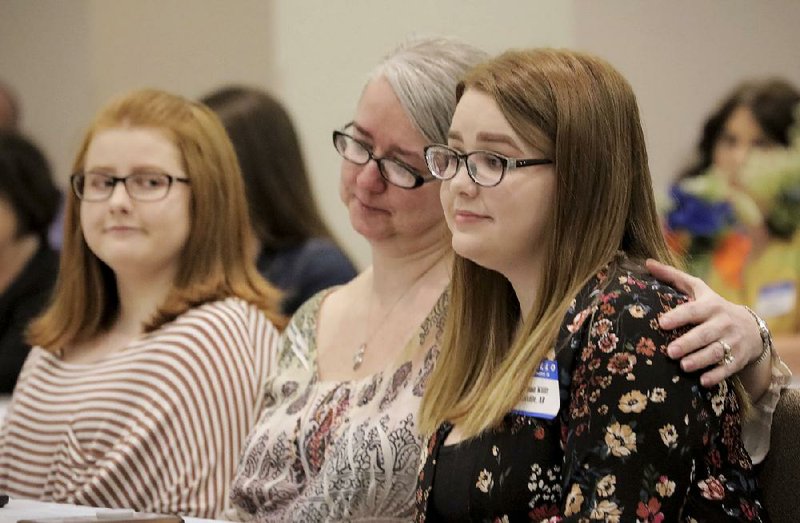Madison Willis had been waiting 12 years to donate a kidney to her younger sister.
Her sister, now 19, was diagnosed with chronic kidney disease when she was 7 years old. Though Willis always wanted to share one of her kidneys -- "Why not me? I would do it," she said -- doctors held off until the two were well-positioned for a transplant.
After months of testing, they came in for surgery Dec. 26.
"I kind of set the bar high for a Christmas present," Willis, 21, said.
Willis, who is from Jessieville, was among 11 honorees celebrated at Wednesday's Chain of Life Awards, an annual program of the Arkansas Kidney Disease Commission.
Created through an act of the Arkansas Legislature in 2011, the awards recognize living donors who offered one of their kidneys to someone in the Natural State.
"Thank you for the example that you set for the rest of us," Arkansas Rehabilitation Services commissioner Alan McClain said. He added that it was "truly impossible" to measure the impact of the group's "selfless actions."
Data from the Organ Transplantation and Procurement Network show that 187 people are on the kidney transplant waiting list in Arkansas, which also is ranked third in the nation for kidney disease deaths.
Advocates say living donors can bridge the gap between the number of kidneys needed and the number of available organs. A National Kidney Foundation fact sheet reports that in the U.S., about 4,000 people die waiting for a kidney each year -- about 12 every day.
"The optimal treatment for kidney failure is transplantation. And studies show that the best-functioning, longest-lasting type of transplant comes from a living donor," those materials say. "But the number of kidneys falls far too short of the need."
Bob Abbott, an Arkansas Kidney Disease Commission founder, said his original idea was for a national initiative that recognized living donors. When that didn't get off the ground, he pushed for a state-level program.
Chain of Life award recipients have to be nominated to be recognized, often by a social worker. They don't receive a cash prize but are publicly commended at a reception.
At the event at the Arkansas Department of Career Education building Wednesday, eight of this year's 11 honorees appeared to share their transplant stories and receive commemorative plaques, which thanked them "for being a vital link in Arkansas' Chain of Life."
They included Alexandra Groves of Rector, who sat up in the middle of the night, feeling that she should donate a kidney to a woman she knew from Facebook.
"God woke me up at 3 o'clock in the morning," she said. "I just had this overwhelming feeling, that that's what he wanted me to do."
Tammy Ward of Cabot, 47, donated a kidney to Shannon Powell, her best friend of more than 30 years.
Ward said Powell hadn't wanted her to be a donor, but had allowed her to get tested, thinking she wouldn't be a candidate.
She was confirmed as a match in August and the transplant surgery took place in January, after things calmed down at Ward's job as the general manager of Community Bakery.
"I told [Powell] she had to stick around to get into mischief when we get older," she said.
The ceremony also honored Arkansas nephrologist Dr. Prajwal Chevireddy with the Bob Abbott Distinguished Service Award.
Chevireddy was selected "for his compassionate, [conscientious] care of his patients and his steady, inspiring leadership in the medical community," a news release said.
For people who are interested in becoming a living kidney donor, there are some restrictions on eligibility, according to the National Kidney Foundation.
Living donors are usually at least 18 years old, must be in good health and can't have certain chronic conditions, such as uncontrolled high blood pressure, diabetes, cancer, HIV or hepatitis.
Willis said she spent three days in the hospital recovering from her donation, but she feels good now.
After the operation, doctors told her to avoid contact sports for a few months and to be mindful of her diet.
Three months after the transplant, her sister, Lauren Willis, says, "I feel better than I have in many years."
After receiving a new kidney, she has more energy and more appetite, though she's not yet sure about her future plans.
"I still need to just process everything and live a little bit," she says.
Metro on 04/04/2019
